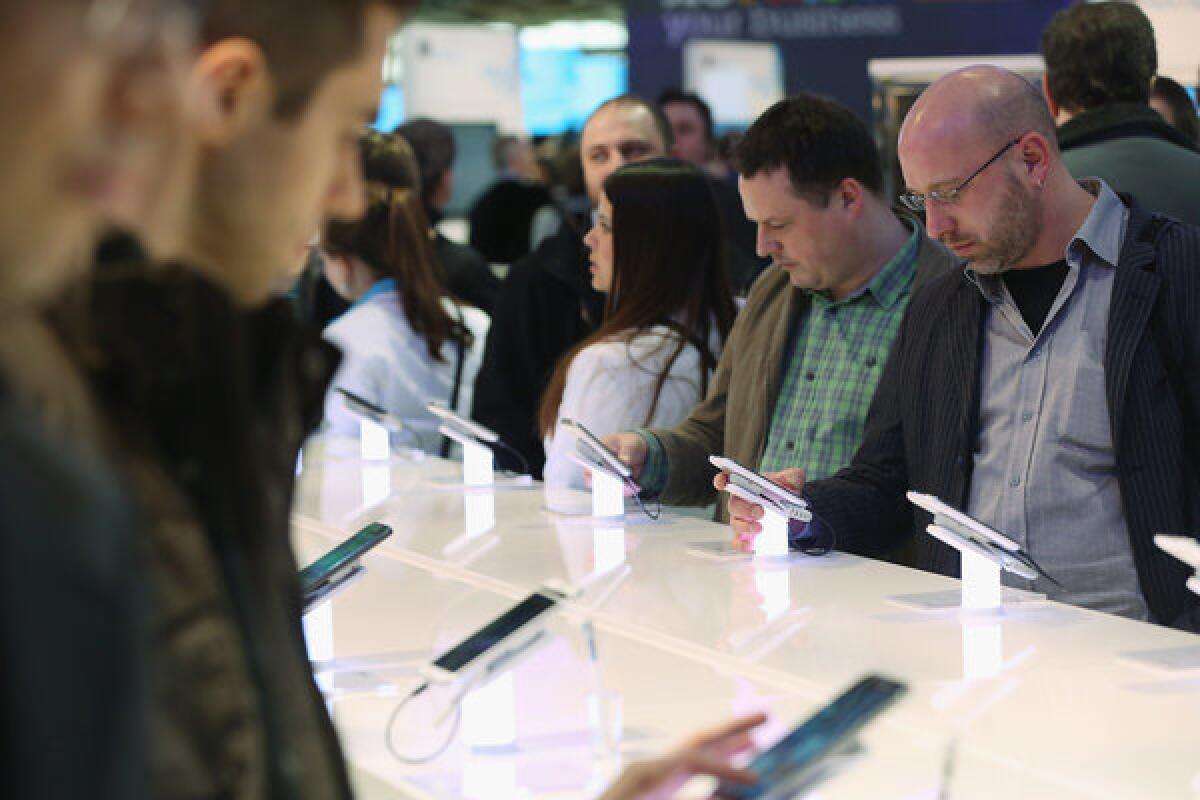Cellphone unlocking for all, not just for some

- Share via
Librarian of Congress James Billington seems to have hit a nerve among his employers when, on the advice of Register of Copyrights Maria A. Pallante, he decided to end consumers’ right to unlock their cellphones.
Lawmakers have introduced, or announced plans to introduce, at least five bills to overturn Billington’s decision, which leaves consumers vulnerable to lawsuits if they circumvent the digital locks on their own phones. The ruling, which took effect in late January, eliminated a protection consumers had enjoyed since 2005, well before the iPhone persuaded the masses to start plunking down hundreds of dollars for a device that they used to get (in a simpler version) for free.
The White House has also declared its support for a legislative fix, and the Federal Communications Commission is exploring what it might be able to do administratively. One question, though, is whether Washington will do more than just grant consumers a right that wireless carriers say they’re happy to support.
The carriers have no problem with unlocking by customers who’ve completed the contract they signed when they bought the device (two years for the typical smartphone; tablet computers, by contrast, are often on month-to-month service agreements). Where it gets dicey is when someone wants to switch networks while still under contract -- for example, to hop temporarily onto a cheaper foreign network when traveling outside the United States. Nor are carriers eager to help customers unlock prepaid phones, particularly newly purchased ones.
Consider the blog post AT&T; published Friday morning. Titled “Bottom line: We Unlock Our Customers’ Devices,” it declared, “AT&T;’s policy is to unlock our customers’ devices if they’ve met the terms of their service agreements and we have the unlock code.”
But that’s not as straightforward or as helpful as AT&T; contends, according to Sina Khanifar, the entrepreneur who won the original exemption for cellphone unlocking and who is a leading advocate for a permanent right to unlock. As Khanifar noted, “met the terms of their service agreements” is quite vague. As it happens, those terms vary according to the type of service one buys from AT&T.;
More important, the refusal to unlock phones until a contract is completed effectively eliminates the buyer’s ownership rights. The carriers argue that people may own the phone hardware but they’re just leasing the software. In other words, when you plunk down $200 or $300 for a smartphone, you’re only buying a functionless assemblage of metal and plastic. You’re leasing the ability to do anything with it.
That’s, let’s see, what’s the right word -- baloney.
Phone companies argue that they put several hundred dollars’ worth of subsidy into the phones they sell, and they need to lock their phones to their networks to recover those subsidies. That would be true if they didn’t include huge early termination fees in the contracts they make their customers sign to buy a subsidized phone. But they do.
Khanifar argues that the answer is to amend the 1998 Digital Millennium Copyright Act to give people the right to circumvent the digital locks on the mobile devices they’ve bought. Under the act, it’s illegal to bypass locks that control access to copyrighted material. The point, though, was to protect movies, software and the like against infringement, not to stop people from changing service providers or violating contracts.
In opposing an exemption for cellphone unlocking, the carriers’ trade association told the copyright office that the locks provided a crucial incentive for companies to develop phone operating-system software. But that argument is rebutted by the enormous investments Apple, Google, Microsoft and Symbian all made in mobile operating systems while circumvention was completely legal.
A real advocate for consumers would fight for a blanket exemption for mobile devices from the digital act’s anti-circumvention provisions, regardless of the phone companies’ opposition. The White House doesn’t appear willing to take up that fight; in its response to a petition from Khanifar, it said it would support a legislative fix for consumers “when they are no longer bound by a service agreement or other obligation.” Thanks but no thanks.
Sen. Ron Wyden (D-Ore.), an exceptionally tech-savvy lawmaker, has taken a much more consumer-friendly stance. His bill would make it legal to circumvent the digital locks on a mobile device you own for the sole purpose of connecting it to another network, provided that you were authorized to use that network. Such a change in law wouldn’t eliminate early termination fees, but it would restore the ownership rights that phone companies have threatened through their aggressive use of digital locks.
ALSO:
Arkansas abortion law: They can’t be serious
Follow Jon Healey on Twitter @jcahealey
More to Read
A cure for the common opinion
Get thought-provoking perspectives with our weekly newsletter.
You may occasionally receive promotional content from the Los Angeles Times.










